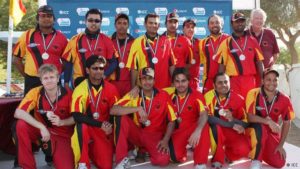Cricket in Germany boosted by refugees
One of the effects of the influx of asylum seekers and refugees into Germany has been a boom in the game of cricket.
Migrants from Pakistan and Afghanistan are driving burgeoning interest in the sport – a story which is set to become the subject of a new feature film.
German Cricket Federation (DCB) Chief Executive Brian Mantle says clubs are springing up all over the country.
“The summer has been unbelievable, we’ve had success on and off the field and we’ve attracted sponsors,” Mr Mantle told reporters this week.
“If you name an area of Germany, chances are there is now a cricket club there or one about to be set up.
“It’s been quite incredible. We could even be soon watching a feature film about German cricket and its impact on Afghan refugees,” Mr Mantle said.
In 2015, Germany took in 890,000 asylum seekers, among them just over 40,000 Afghans and Pakistanis. Many of them were soon looking for somewhere to play.
Before refugees began arriving in large numbers last year, there were only around 1,500 active cricketers playing in 70 teams in football-mad Germany.
Now there are 5,000 cricketers, playing in around 250 teams for 108 clubs — and the numbers are growing.
 The German national German, many of whose members have roots in cricket-mad India, Pakistan, Sri Lanka and Afghanistan, has just won promotion from the International Cricket Council’s European Division Two.
The German national German, many of whose members have roots in cricket-mad India, Pakistan, Sri Lanka and Afghanistan, has just won promotion from the International Cricket Council’s European Division Two.
“The goal for next year is to win promotion again in division one, which would put us in the world cricket league,” Mr Mantle said.
“We wouldn’t be at the elite level, but we would have arrived.”
The cricket craze has generated huge publicity and now interest from a London-based film company, Life & Soul Pictures, to bring the story of German cricket to the cinema.
The project is in its early stages, but has the working title Rites of Passage.
The scripted is being written by Berlin-based writer O’Neil Sharma, who worked on Quentin Tarantino’s 2009 film Inglorious Bastards and the 2008 Tom Cruise film Valkyrie.
The story caught Mr Sharma’s imagination as the son of Indian immigrants who was brought up in London.
He said he was sick of reading negative stories about refugees and wanted to write a story about how sport can bring cultures together.
German representative player Hamid Wardak said he was not even aware that cricket was played in Germany when he arrived in 2011.
He said it was an honour to represent Germany.
The 28-year-old speaks fluent German, lives in the northern city of Bremerhaven and works for the local authority as a translator to help refugees.
His passion is cricket, but he came to Germany for love, to marry an Afghan woman based here.
“But the love of the game made me find cricket in Germany,” he said.
Wardak is an example of the integration through sport that German Chancellor Angela Merkel perhaps never imaging when she open her nations’ borders to refugees.
He was born in Kabul in 1988, but as the civil war flared, his parents took him and his three brothers to the Pakistani border city of Peshawar in 1991, then deeper into Pakistan in 1999.
One of his brothers was shot dead in Afghanistan and his father died of cancer, leaving only his mother and two brothers there.
He says his family is living in a precarious situation in Pakistan.
He worries constantly about his mother but the chance to play cricket in his adopted country comes as a relief.
His cricket team is multicultural with players from Pakistan, India, Sri Lanka, Afghanistan and Australia.
Laurie Nowell
AMES Australia Senior Journalist












